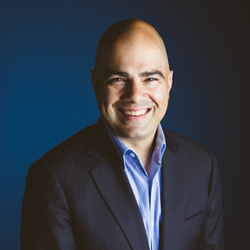What a bank failure means for consumers and retirees

Consumers across the nation are still grappling with the recent bank failure news. For agents and advisors, your clients will have two questions that you might want to prepare for: How does this affect my financial position, and is this the start of something bigger? Here's some information we’ve gathered along with some suggestions on how to position the bank failure news when speaking with your clients.

Emotional reactions and making decisions based on headlines and newscasts aren't recommended. From the top down, the answers to these and many other questions are, first, be smart and don't overreact. Be skeptical of what the mainstream media is reporting. Despite their instincts to protect their financial positions, your clients shouldn't be pulling all assets and heading for the hills.
Instead, this is a great opportunity to have a meaningful conversation with clients to ease their concerns and review their portfolios. This is a great reason to reach out, engage in conversation and continue to offer value while calming fears and building trust.
Your clients will want to know what happened, how it happened and why it happened. It’s important to note that clients will want to know your thoughts about what happens next.
In the short term, we expect equities to move quickly based on the latest headlines in an evolving situation. However, the bond market has moved decisively and is the important indicator we are watching. The 2-Year Treasury went from a yield of 5% to about 4% (bond prices rise when yields decline) in less than five days. This is an enormous move in the bond market and is telling us the bond market expects the Fed to ease up, if not stop, any further interest rate increases. After the dust settles, that should alleviate the pressure that rate increases have put on stocks and bonds.
This isn't another 2008 global financial crisis. Although the banking system is stressed by a major bank failure, the banking system in general is over-capitalized. The major banks considered global systemically important institutions today abide by the Total Loss Absorbing Capacity Rules that were put in place after the 2008 crisis. Silicon Valley Bank, Signature Bank and regional banks haven't been subject to those rules.
Cooler heads prevail in the midst of bank failure
After your clients have absorbed the shockwave of SVB and other bank news, it’s time to discuss how this affects their financial position and outline various options and opportunities. For example, this might be a good time to review with them any bank accounts that might be over the FDIC limit and discuss options toward diversifying banks or placing assets in an investment account to alleviate certain bank-specific risks.
What clients need right now is a calm, educated, proactive approach to safeguarding their financial futures. Clients must be strategic, learn about all available financial products to meet their needs, and research themselves, with you as their guide. Helping your clients get the facts, to trust by verifying and to examine what others did who didn't lose their money in market declines is imperative.
What should advisors do?
First, it’s time to meet with your clients. Take this opportunity to review their investment strategy and the actions involved. Can financial, banking and insurance product education help your clients invest more wisely? Ask them, “Why are you taking risks with the income portions of your portfolio?
Then review other financial products that are safer and provide guarantees to grow their portfolio. We believe investors are best served by allocating long-term investment assets to a globally diversified portfolio consistent with their risk profile and maintaining a solid discipline to allow the markets to work overtime.
Another question to ask is, how they feel about fractional lending now as a banking customer. Do they feel more comfortable with their money being invested into a 100% financial reserve product such as an annuity or do they still believe that all banks are safe?
Helping clients choose wisely
As a trusted and reliable fiduciary advisor, making solid recommendations on how clients can protect their hard-earned and hard-saved assets is your single priority. As a fiduciary, you're legally bound to act in your clients’ best interests. Clients trust a fiduciary financial advisor to give honest and unbiased advice about retirement planning. Here are some of the leading conversations you might want to consider having with clients on the heels of today’s bank failure news.
First, is it time to consider cashing in bank certificates of deposit and investing in safer products with 100% financial reserve? Products such as multi-year guaranteed annuities, fixed indexed annuities and indexed universal life insurance are options to consider for those looking for a higher rate of return with protection from market volatility.
Regarding annuities, all the people who criticize annuities, while also claiming that no FDIC depositor has ever lost their money deposited in a bank might be re-thinking their position. Are critics of annuities saying anything worthwhile today? There are no headlines that annuity companies are going under right now, which is a stark contrast to what is happening in U.S. banks right now.
MYGAs offer a guaranteed return of principal and interest at a fixed rate for the life of the contract. FIAs offer higher rates with the potential to earn more based on the performance of an index, such as the S&P 500. IULs are a type of life insurance policy that offers a death benefit, as well as the potential for cash value growth that's linked to the performance of an index. All three of these products offer protection against loss of principal and offer higher returns than traditional bank CDs. Investing in these products can help your clients take advantage of higher returns with the safety of a 100% financial reserve.
Intersection of health and wealth planning
Despite where your clients are in their retirement planning journey, there are a few tips that each should consider given the recent news. First, don't place anything more than $250,000 in a single bank. Second, advise clients it might be wise to hold at least one month of expenses in currency, in their home (in a safe) or in different areas of the home. Advise them to keep an eye on their risk levels and, most importantly, take a 360-degree holistic approach to not just wealth, but health planning as well. This will ultimately strengthen retirement planning and put them in a better position to face whatever the future holds.
Ford Stokes is the founder, president and senior financial advisor with Active Wealth Management and independent advisor through Brookstone Capital Management. Views and options are the author’s own and don't represent those of Brookstone. Click here for disclosure. Ford may be contacted at [email protected].
© Entire contents copyright 2023 by InsuranceNewsNet.com Inc. All rights reserved. No part of this article may be reprinted without the expressed written consent from InsuranceNewsNet.com.




Peter Woo named Asian American Insurance Network chairperson, president
Accounting standard dampens life insurers’ interest in high-interest bonds
Advisor News
- Trump pick for Treasury: extending tax cuts the ‘most important’ issue
- Treasury Secretary nominee Scott Bessent says Trump tax cuts should not expire
- Five retirement-industry trends to watch in 2025
- U.S. military veteran workers report higher levels of financial well-being
- US inflation picked up in December, though underlying price pressures ease
More Advisor NewsAnnuity News
- Midland Advisory Focused on Growing Registered Investment Advisor Channel Presence
- Delaware Life Announces Suite of Innovative Fixed Index Annuities
- Allianz Life moves to strengthen annuity operations with own reinsurer
- Global Atlantic Announces New Registered Index-Linked Annuity
- AM Best Affirms Credit Ratings of Reinsurance Group of America, Incorporated and Subsidiaries
More Annuity NewsHealth/Employee Benefits News
- Anthem's members could lose health insurance coverage in Stamford Health system after March 1.
- Insurers question need for prosthetics, limit coverage
- Social Security: Submit your continuing disability review report online
- Is a 'people before profit' model the solution in the United States?
- Missouri proposal could block health insurers from limiting anesthesia coverage
More Health/Employee Benefits NewsLife Insurance News
- AM Best Affirms Credit Ratings of Prudential Financial, Inc. and Its Life/Health Subsidiaries
- Symetra reaches $32.5 million settlement over cost-of-insurance charges
- Registration Statement – Specified Transactions (Form S-3)
- Symetra Names Christine Carlson Vice President, Stop Loss Claims
- Best’s Market Segment Report: AM Best Maintains Stable Outlook on India’s Non-Life Insurance Segment
More Life Insurance News